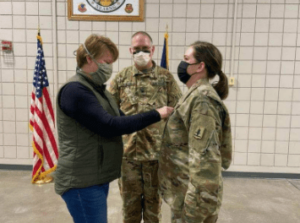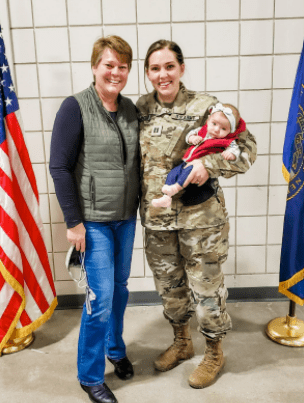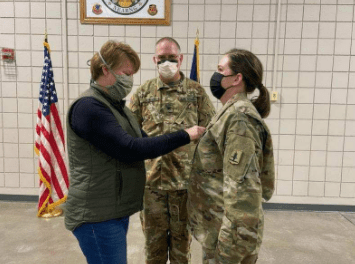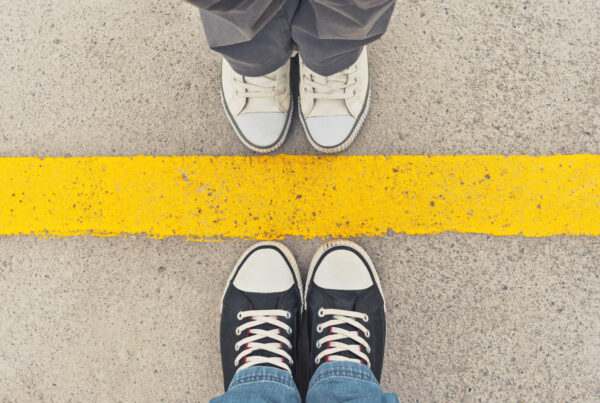by Sara Croymans, MEd, AFC
Nearly every transition in one’s life is marked by a ritual:
-
- Religious ceremonies of baptisms, weddings, or funerals.
- ‘Coming of age’ rituals such as a bar/bat mitzvah or a quinceañera to recognize a significant time in a young person’s life.
- Holidays like Halloween with trick or treating, Thanksgiving with turkey dinner, and Hanukkah with a nightly menorah lighting or opening presents on Christmas morning. .
-
- Family birthdays, meal time, or the transfer of property from one generation to the next.
- Daily rituals for waking up each morning related to prayer or meditation or shifting into and out of their work day.
Military Rituals
The military is no exception – rituals abound to mark significant transitions. On installations, the daily bugle call marks the reveille and retreat when the American flag is raised and lowered. There is a ritual when someone signs up for the military and a ceremony to mark graduation from Basic Combat Training. The military also utilizes ceremonies when service members leave for or return from a deployment. (See Here, First Sergeant!, an OneOp blog post describing a deployment activation ceremony.)
Another unique ritual commonly utilized in the military environment is promotion ceremonies. I recently had the opportunity to attend my daughter  Kristen’s promotion ceremony, where she was pinned with the rank of Captain in the Nebraska Army National Guard. I was honored to remove her old rank ( taking off her old rank patch and tossing them aside) and apply the new rank insignia on her uniform (with a light punch to the chest to ensure it stayed on – also a common military ritual).
Kristen’s promotion ceremony, where she was pinned with the rank of Captain in the Nebraska Army National Guard. I was honored to remove her old rank ( taking off her old rank patch and tossing them aside) and apply the new rank insignia on her uniform (with a light punch to the chest to ensure it stayed on – also a common military ritual).
The Value of Transitions
Abigail Brenner, M.D., writes that “rituals are symbolic enactments that represent what change really means to you personally and as such, are powerful tools that help transform you through transition.” She shares five ways to think about how rituals help one move through change and transition. Rituals can:
-
- Show us how our individual lives are part of a much grander design.
- Provide an ongoing way to structure one’s life.
- Remove us from the ordinary flow of life and can place us in a sacred space.
- Give meaning to one’s journey and a sense of purpose to life
- Mark “rites of passage” that help us “connect the dots.”
 Family rituals are important for military families. A Military.com article shares that family rituals are important because they:
Family rituals are important for military families. A Military.com article shares that family rituals are important because they:
-
- Strengthen family connections.
- Give children a sense of security that comes from knowing what to expect and when to anticipate it.
- Give a family its own ‘personality’ and sense of being unique and special.
- Reinforce a family’s values.
- Help family members cope during challenging times.
Strategies & Resources
As a military family service provider, Cooperative Extension educator, or someone who connects with military families on a personal level, consider sharing these strategies and resources on rituals for military life transitions:
-
- Help families new to military service become more familiar with military rituals and the related protocols.
- Encourage military families with young children to develop daily routines. Sesame Street for Military Families offers resources on routines related to everyday practices and rituals including bedtime, meal time, and waiting routines.
- Assist families impacted by deployment to build new rituals before, during, and after the deployment.
- Suggest that military families who are separated over the holidays create new holiday traditions while their Service member is away.
- Encourage military family members to make self-care a ritual. The Mississippi State University Extension provides tips and a self-care planning template for individuals to take care of themselves. Service providers could benefit from this as well.
This blog post was written by Sara Croymans, MEd, AFC, University of Minnesota Extension Educator, member of the OneOp Family Transitions team, military spouse, and mother. Family Transitions provides education, resources and networking opportunities for professionals working with military families to build resilience and navigate life cycle transitions. Engage with the OneOp Family Transitions team on our website, Facebook, and Twitter.















